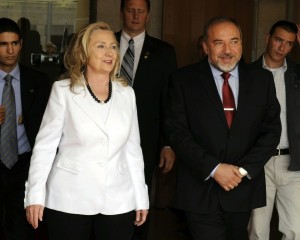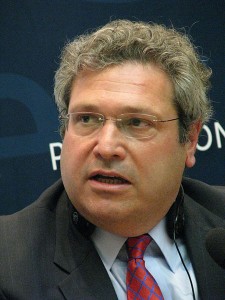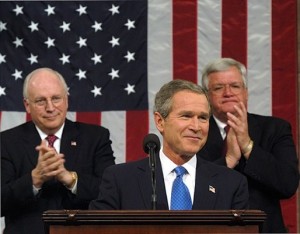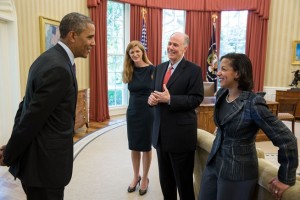Former Secretary of State Clinton grudgingly admits her Iraq War vote was a “mistake,” but it was not a one-off misjudgment. Clinton has consistently stood for a war-like U.S. foreign policy that ignores international law and relies on brinkmanship and military force, writes Nicolas J S Davies.
By Nicolas J S Davies
A poll taken in Iowa before the presidential caucus found that 70 percent of Democrats surveyed trusted Hillary Clinton on foreign policy more than Bernie Sanders. But her record as Secretary of State was very different from that of her successor, John Kerry, who has overseen groundbreaking diplomatic breakthroughs with Iran, Cuba and, in a more limited context, even with Russia and Syria.
In fact, Clinton’s use of the term “diplomacy” in talking about her own record is idiosyncratic in that it refers almost entirely to assembling “coalitions” to support U.S. threats, wars and sanctions against other countries, rather than to peacefully resolving international disputes without the threat or use of force, as normally understood by the word “diplomacy” and as required by the UN Charter.

Secretary of State Hillary Clinton meeting with Israel’s right-wing Foreign Minister Avigdor Lieberman in Jerusalem on July 16, 2012. (Photo credit: Department of State)
There is another term for what Clinton means when she says “diplomacy,” and that is “brinksmanship,” which means threatening war to back up demands on other governments. In the real world, brinksmanship frequently leads to war when neither side will back down, at which point its only value or purpose is to provide a political narrative to justify aggression.
The two main “diplomatic” achievements Clinton gives herself credit for are: assembling the coalition of NATO and the Arab monarchies that bombed Libya into endless, intractable chaos; and imposing painful sanctions on the people of Iran over what U.S. intelligence agencies concluded by 2007 was a peaceful civilian nuclear program.
Clinton’s claim that her brinksmanship “brought Iran to the table” over its “nuclear weapons program” is particularly deceptive. It was in fact Secretary Clinton and President Obama who refused to take “Yes” for an answer in 2010, after Iran agreed to what was originally a U.S. proposal relayed by Turkey and Brazil. Clinton and Obama chose instead to keep ratcheting up sanctions and U.S. and Israeli threats. This was a textbook case of dangerous brinksmanship that was finally resolved by real diplomacy (and real diplomats like Kerry, Russian Foreign Minister Sergei Lavrov and Iranian Foreign Minister Javad Zarif) before it led to war.
That Clinton can peddle such deceptive rhetoric to national prime-time television audiences and yet still be considered trustworthy on foreign policy by many Americans is a sad indictment of the U.S. corporate media’s coverage of foreign policy, including a willful failure to distinguish between diplomacy and brinksmanship.
But Michael Crowley, now the senior foreign affairs correspondent for Politico, formerly with Time and the New Republic, has analyzed Clinton’s foreign policy record over the course of her career, and his research has shed light on her Iraq War vote, her personal influences and her underlying views of U.S. foreign policy, all of which deserve serious scrutiny from American voters.
The results of Crowley’s research reveal that Clinton believes firmly in the post-Cold War ambition to establish the U.S. threat or use of force as the ultimate arbiter of international affairs. She does not believe that the U.S. should be constrained by the UN Charter or other rules of international law from threatening or attacking other countries when it can make persuasive political arguments for doing so.
This places Clinton squarely in the “humanitarian interventionist” camp with her close friend and confidante Madeleine Albright, but also in underlying if unspoken agreement with the “neocons” who brought us the Iraq War and the self-fulfilling and ever-expanding “war on terror.”
Neoconservatism and humanitarian interventionism emerged in the 1990s as parallel ways to exploit the post-Cold War “power dividend,” each with its own approach to overcoming legal, diplomatic and political obstacles to the unbridled expansion of U.S. military power. In general, Democratic power brokers favored the humanitarian interventionist approach, while Republicans embraced neoconservatism, but their underlying goals were the same: to politically legitimize U.S. hegemony in the post-Cold War era.
The most self-serving ideologues, like Robert Kagan and his wife Victoria Nuland, soon mastered the nuances of both ideologies and have moved smoothly between administrations of both parties. Victoria Nuland, Dick Cheney’s deputy foreign policy adviser, became Secretary Clinton’s spokesperson and went on to plan the 2014 coup in Ukraine. Robert Kagan, who co-founded the neocon Project for the New American Century with William Kristol in 1997, was appointed by Clinton to the State Department’s Foreign Affairs Policy Board in 2011.

Prominent neocon intellectual Robert Kagan. (Photo credit: Mariusz Kubik, http://www.mariuszkubik.pl)
Kagan wrote of Clinton in 2014, “I feel comfortable with her on foreign policy. If she pursues a policy which we think she will pursue, it’s something that might have been called neocon, but clearly her supporters are not going to call it that; they are going to call it something else.”
In the Clinton White House
In her husband’s White House in the 1990s, Hillary Clinton was not an outsider to the foreign policy debates that laid the groundwork for these new ideologies of U.S. power, which have since unleashed such bloody and intractable conflicts across the world.
In 1993, at a meeting between Clinton’s transition team and Bush’s National Security Council, Madeleine Albright challenged then Chairman of the Joint Chiefs of Staff Colin Powell on his “Powell Doctrine” of limited war. Albright asked him, “What’s the point of having this superb military you’re always talking about if we can’t use it?”
Hillary Clinton found common ground with Albright, and has likewise derided the Powell doctrine for limiting U.S. military action to “splendid little wars” like the invasions of Grenada, Panama and Kuwait, apparently forgetting that these are the only wars the U.S. has actually won since 1945.
Hillary Clinton reportedly “insist(ed)” on Albright’s nomination as Secretary of State in December 1996, and they met regularly at the State Department during Bill Clinton’s second term for in-depth foreign policy discussions aided by White House and State Department staff. Albright called their relationship “an unprecedented partnership.”
With Defense Secretary William Cohen, Albright oversaw the crystallization of America’s aggressive post-Cold War foreign policy in the late 1990s. As UN Ambassador, she maintained and justified sanctions on Iraq, even as they killed hundreds of thousands of children. As Secretary of State, she led the push for the illegal U.S. assault on Yugoslavia in 1999, which set the fateful precedent for further U.S. violations of the U.N. Charter in Afghanistan, Iraq, Pakistan, Somalia, Yemen, Libya and Syria.
James Rubin, Albright’s State Department spokesman, remembers strained phone calls between Albright and U.K. Foreign Secretary Robin Cook during the planning for the bombing of Yugoslavia. Cook told Albright the U.K. government was having problems “with its lawyers” because attacking Yugoslavia without authorization by the U.N. Security Council would violate the UN Charter. Albright told him the U.K. should “get new lawyers.”
Like Secretary Albright, Hillary Clinton strongly supported NATO’s illegal aggression against Yugoslavia. In fact, she later told Talk magazine that she called her husband from Africa to plead with him to order the use of force. “I urged him to bomb,” she said, “You cannot let this go on at the end of a century that has seen the major holocaust of our time. What do we have NATO for if not to defend our way of life?”
After the U.S.-U.K. bombing and invasion, the NATO protectorate of Kosovo quickly descended into chaos and organized crime. Hashim Thaci, the gangster who the U.S. installed as its first prime minister, now faces indictment for the very war crimes that U.S. bombing enabled and supported in 1999, including credible allegations that he organized the extrajudicial execution of Serbs to harvest and sell their internal organs.
On Clinton’s holocaust reference, the U.S. and U.K. did carpet-bomb Germany at the height of the Nazi Holocaust, but bombing could not stop the genocide of European Jews any more than it can have a “humanitarian” impact today. The Western allies’ decision to rely mainly on bombing throughout 1942 and 1943 while the Red Army’s “boots on the ground” and the civilians in the concentration camps died in their millions cast a long shadow on today’s policy debates over Syria, Iraq and Libya.
War is always an atrocity and a crime, but relying on bombing and drones to avoid putting “boots on the ground” is uniquely dangerous because it gives politicians the illusion that they can wage war without political risk. In the longer term, from London in the Blitz to Vietnam, Cambodia and Laos to Islamic State and drone victims today, bombing has always been the surest way to provoke righteous anger, stiffen resistance and reap a whirlwind of blowback.
The 140,000 bombs and missiles the U.S. and its allies have rained down on at least seven countries since 2001 are the poisonous seeds of a harvest of intractable conflict that is still gathering strength after 14 years of war.
The Clinton administration formalized its illegal doctrine of unilateral military force in its 1997 Quadrennial Defense Review, declaring, “When the interests at stake are vital we should do whatever it takes to defend them, including, when necessary, the unilateral use of military power. U.S. vital national interests include preventing the emergence of a hostile regional coalition (and) ensuring uninhibited access to key markets, energy supplies and strategic resources.”
Arguments based on “vital interests” are dangerous precisely because they are politically persuasive to the citizens of any country. But this is precisely the justification for war that the U.N. Charter was designed to prohibit, as the U.K.’s senior legal adviser, Sir Gerald Fitzmaurice, explained to his government during the Suez crisis in 1956. He wrote, “The plea of vital interest, which has been one of the main justifications for wars in the past, is indeed the very one which the U.N. Charter was intended to exclude.”
Senator Clinton’s Iraq War Vote
Sixteen years after the bombing of Yugoslavia, bombing to “prevent holocausts” and wars to “defend” ill-defined and virtually unlimited U.S. interests have succeeded only in launching a new holocaust that has killed at least 1.6 million people and plunged a dozen countries into intractable chaos.

President George W. Bush pauses for applause during his State of the Union Address on Jan. 28, 2003, when he made a fraudulent case for invading Iraq. Seated behind him are Vice President Dick Cheney and House Speaker Dennis Hastert. (White House photo)
As Republican Senator Lincoln Chafee wrote of his colleagues who voted to authorize war on Iraq in 2002, “Helping a rogue President start an unnecessary war should be a career-ending lapse of judgment…”
As the results of that decision keep spinning farther out of control, it seems increasingly remarkable that U.S. officials who authorized a war based on lies with millions of lives in the balance still have careers in public policy. If it costs Clinton another presidential nomination, that is a small price to pay when weighed against the holocaust she helped to unleash on tens of millions of people.
But what if her vote for an illegal and devastating war was not a momentary “lapse of judgment”, but was in fact consistent with her views then and her views now?
As the Bush administration lobbied senators to support the Iraq AUMF in 2002, Senator Clinton had several private chats with Deputy National Security Advisor Stephen Hadley, an old friend from Yale Law School. An unnamed Bush official, possibly Hadley, told Michael Crowley, “I was kind of pleasantly surprised by her attitude.”
But Albright’s former assistant James Rubin was not surprised by Clinton’s vote on Iraq. He found it consistent with the position of the Clinton administration and Albright’s State Department that U.S. “diplomacy” must be backed up by the threat of military force.
“I think there is a connection to her vote,” Rubin told Michael Crowley, “which is recognizing that the right combination of force and diplomacy (sic) can achieve America’s objectives. Sometimes, to get things done – like getting inspectors back into Iraq – you do have to be prepared to threaten force.”
But this evades the critical question of U.S. obligations under the U.N. Charter, which prohibits the threat and use of force. Senator Levin introduced an amendment to the Iraq AUMF bill that would have only authorized the use of force if it was approved by the U.N. Security Council. Senator Clinton voted against that amendment, making it clear that she supported the threat and use of force against Iraq whether it was legal or not.
Clinton has defended her vote on the basis of providing a credible threat of force to back up the call for inspections, in keeping with her long-standing preference for threats and brinksmanship over diplomacy. But the problem with threats of force is that they often lead to the use of force, as we have now seen repeatedly since the U.S. has embraced this aggressive and illegal approach to international affairs.
This is exactly why the U.N. Charter prohibits the threat as well as the use of force. The absolute priority of world leaders in 1945 was peace, and so the U.N. Charter prohibited both the threat and use of force, based on bitter experience of how the one so easily leads to the other.
The fundamental shift in U.S. foreign policy since the 1980s has been to renounce peace as an overriding priority and to politically legitimize U.S. war-making. The U.S. has therefore, without public debate, abandoned FDR’s post-WWII “permanent structure of peace” based on the U.N. Charter. The U.S. also withdrew from the compulsory jurisdiction of the International Court of Justice, after it found the U.S. guilty of aggression against Nicaragua in 1986, and it likewise rejects the jurisdiction of the new International Criminal Court.
U.S. government lawyers now pass off political arguments as legal cover for aggression, torture, killing civilians and other war crimes, secure in the knowledge that they will never be forced to defend their legally indefensible opinions in impartial courts.
When President George W. Bush unveiled his illegal “doctrine of preemption” in 2002, Sen. Edward Kennedy called it, “a call for Twenty-first Century American imperialism that no other nation can or should accept.”
But the same must be said of this entire decades-long effort by the Clintons, Bushes, Albright, Cheney and others to liberate the U.S. military industrial complex from the restraints placed upon it by the rule of international law.
Secretary of State – Iraq and Afghanistan
Hillary Clinton’s actions as Secretary of State were consistent with her role working with her husband and Madeleine Albright in the 1990s, and in the Senate with the Bush administration, to fundamentally corrupt U.S. foreign policy.
Robert Gates’s book, Duty: Memoirs of a Secretary at War, has provided revealing insights into Clinton’s personal contributions to White House foreign policy debates on the vital issues of Obama’s first term, in which she was always the most hawkish of Obama’s senior advisers, more hawkish than his Republican Secretary of Defense.
 At Clinton’s first “town hall” with foreign service officers at the State Department, Steve Kashkett of the American Foreign Service Association asked Clinton how soon the State Department’s deployment of 1,200 staff to the massive U.S. occupation headquarters in Baghdad would be reduced “to that of a normal diplomatic mission” to ease critical understaffing at other U.S. embassies all over the world.
At Clinton’s first “town hall” with foreign service officers at the State Department, Steve Kashkett of the American Foreign Service Association asked Clinton how soon the State Department’s deployment of 1,200 staff to the massive U.S. occupation headquarters in Baghdad would be reduced “to that of a normal diplomatic mission” to ease critical understaffing at other U.S. embassies all over the world.
Clinton instead launched a “civilian surge,” doubling the already overweight State Department deployment in Baghdad to 2,400. When the Iraqi government refused to allow 3,000 U.S. troops to remain in Iraq to protect the embassy staff – and Clinton had wanted even more than that – she hired 7,000 heavily-armed mercenaries to do the job instead.
As Clinton doubled down on the failed U.S. effort to control a puppet government in Iraq whose courageous people’s resistance had already made U.S. military occupation unsustainable, she was also keen to put the lives of more U.S. troops on the line in the even longer-running quagmire in Afghanistan.
When President Obama took office, there were 34,400 U.S. troops in Afghanistan, but only 645 had been killed in seven years of combat. A Pew poll found that only 18 percent of Afghans surveyed wanted more U.S. troops in their country.
Secretary Clinton backed Obama’s first decision to commit an additional 30,000 troops to the war. Then, in mid-2009, General Stanley McChrystal submitted a request for a second increase of 40,000 troops. He also submitted a classified assessment that a genuine campaign to defeat the Taliban and its allies would require 500,000 U.S. troops for five years, acknowledging that neither 65,000 nor 105,000 troops could possibly achieve that.
Clinton supported McChrystal’s request and was eager to match it with a State Department “civilian surge” like the one in Iraq. Among Obama’s other advisers, Vice President Joe Biden opposed any further escalation, while Secretary Gates recommended a smaller increase of 30,000 troops, which was what Obama ultimately approved.
When Obama and his aides debated the withdrawal of U.S. troops from Afghanistan, Clinton was again the most hawkish, arguing for no reduction in troop strength until 2013. In a typically arbitrary political compromise, Obama split the difference between Clinton and the doves and ordered the first withdrawals to begin in September 2012.
By the time the U.S. “combat mission” ended in 2014, 2,356 U.S. troops had met their deaths in the “graveyard of empires.” In 2016, the Taliban and its allies control more of Afghanistan than at any time since 2001, as they fight to expel the 10,000 U.S. troops still deployed there.
A complete withdrawal of foreign troops has always been the Taliban’s first precondition for opening serious peace talks with the government, so the 2009-10 escalations, which Clinton backed to the hilt, served only to kill 1,711 more Americans and tens of thousands of Afghans, prolonging the war and undermining diplomacy in the futile hope of saving a corrupt regime of U.S.-backed warlords and drug-lords.
President Obama’s latest plan, to keep at least 5,500 U.S. troops in Afghanistan indefinitely, ensures that the war will continue into the next administration, even as Islamic State begins to move into another failed state already devastated by more than 60,000 U.S. bombs and missiles.
Secretary of State – Libya and Syria
President Obama’s advisers were even more divided over launching a new war to overthrow the government of Libya. Despite Secretary Gates telling a Congressional hearing that the first phase of a “no-fly zone” would be a bombing campaign to destroy Libyan air defenses, a Pew poll found that, while 44 percent of the public supported a “no-fly zone,” only 16 percent supported “bombing Libyan air defenses.” Even after being caught with its pants down over Iraq, the U.S. corporate media has not lost its talent for confusing Americans into war.

President Barack Obama talks with members of his national security team, from left, UN Ambassador-designate Samantha Power, outgoing National Security Advisor Tom Donilon, and incoming National Security Advisor Susan Rice on June 5, 2013. (Official White House Photo by Pete Souza)
Secretary Gates wrote in Duty that he was so opposed to U.S. intervention in Libya that he considered resigning. President Obama was so undecided that he called his final decision a “51-49 call.” The other advocates for bombing were U.N. Ambassador Susan Rice and National Security Council staffers Ben Rhodes and Samantha Power, so Secretary Clinton was the most senior, and almost certainly the decisive voice in sealing the fate of Muammar Gaddafi and the people of Libya.
Despite a U.N. resolution that authorized military force only to “protect civilians,” the U.S. and its allies intervened to support forces who were explicitly fighting to overthrow the Libyan government. NATO and its Arab monarchist allies conducted 7,700 air strikes in seven months, while NATO warships shelled coastal cities. The rebel forces on the ground, including Islamist fundamentalists, were trained and led on the ground by Qatari, British, French and Jordanian special forces.
In their short-sighted triumphalism over Libya, NATO and Arab monarchist leaders thought they had finally found a model for regime change that worked. Seduced by the blood-drenched mirage in the Libyan desert, they made the cynical decision to double down on what they knew very well would be a longer, more complicated and bloodier proxy war in Syria.
Only a few months after a gleeful Secretary Clinton hailed the sodomy and assassination of Gaddafi, unmarked NATO planes were flying fighters and weapons from Libya to the “Free Syrian Army” training base at Iskenderum in Turkey, where British and French special forces provided more training and the CIA and JSOC infiltrated them into Syria.
Residents of Aleppo were shocked to find their city invaded, not by Syrian rebels, but by Islamist fighters from Chechnya, Uzbekistan, Jordan, Saudi Arabia, Iraq and Egypt. Despite the already brutal repression of the Syrian government, a Qatari-funded YouGov poll in December 2011 found that 55 percent of Syrians still supported their government, understanding that the alternative could be much worse.
Secretary Clinton and French President Nicolas Sarkozy assembled the Orwellian “Friends of Syria” coalition that undermined Kofi Annan’s 2012 peace plan by committing more funding, arms and support to their proxy forces instead of pressuring them to honor Annan’s April 10th ceasefire and begin negotiations for a political transition.
When Annan finally got all the countries involved to sign on to the Geneva communique on June 30, 2012, providing for a new ceasefire and a political transition, he received assurances that it would quickly be formalized in a new U.N. Security Council resolution. Instead, Clinton and her allies revived their precondition that President Assad must resign before any transition could begin, the critical precondition they had set aside in Geneva. With no possibility of agreement in the Security Council, Annan resigned in despair.
Almost four years later, hundreds of thousands of Syrians have been killed in an ever more convoluted and dangerous war, now involving the armed forces of 16 countries, each with their own interests and their own relationships with different proxy forces on the ground. In many areas, the U.S. supports and arms both sides.
Turkey, a NATO member and major U.S. arms buyer, is attacking the YPG Kurdish forces who have been the U.S.’s most effective ally on the ground against Islamic State. And the sectarian government to whom the U.S. handed over the ruins of Iraq is sending U.S.-armed militias to fight U.S.-armed rebels in Syria.
Obama’s and Clinton’s doctrine of covert and proxy war, by which they still tout drone strikes, JSOC death squads, CIA coups and local proxy forces as politically safe “tools” to project U.S. power across the world without the deployment of U.S. “boots on the ground,” has destroyed Libya, Yemen, Syria and Ukraine, and left U.S. foreign policy in an unprecedented crisis.
Hanging over this escalating, out-of-control crisis is the existential danger of war between the U.S. and Russia, who together possess 14,700 nuclear weapons with the destructive power to end life on Earth as we know it. With her demonstrated, deeply-held belief in the superiority of threats, brinksmanship and war over diplomacy and the rule of law, surely the last thing the world needs now is Hillary Clinton playing chicken with the Russians while the fate of life on Earth hangs in the balance.
Based on Sen. Bernie Sanders’ record in Congress, his prescient floor speech during the Iraq War debate in 2002 and his campaign’s position statement on “War and Peace”, he at least understands the most obvious lesson of U.S. foreign policy in the post-Cold War era, that it is easier to unleash the dogs of war than to call them off once they have tasted blood. Incredibly, this makes him almost unique among U.S. leaders of this generation.
But there are real flaws in Sanders’s position statement. He cites “vital strategic interests” as a justification for war, dodging the thorny problem that international disputes typically involve “vital strategic interests” on both sides, which the U.N. Charter addresses by requiring them to be resolved peacefully without the threat or use of force.
And instead of pointing out that Clinton’s brinksmanship with Iran risked a second war in 10 years over non-existent WMDs, he repeats the canard that Iran was “developing nuclear weapons” before the signing of the JCPOA in 2015.
Sen. Sanders has launched an unprecedented campaign to challenge the way powerful vested interests have corrupted our elections, our political system and our economy. But the same interests have also corrupted our foreign policy, squandering our national wealth on weapons and war, killing millions of people and plunging country after country into war, ruin and chaos.
To succeed, the Sanders “revolution” must restore integrity to our country’s role in the world as well as to our political and economic system.
Nicolas J S Davies is the author of Blood On Our Hands: the American Invasion and Destruction of Iraq. He also wrote the chapters on “Obama at War” in Grading the 44th President: a Report Card on Barack Obama’s First Term as a Progressive Leader.


INTERNATIONAL DIPLOMATIC BULLYING
SMART DIPLOMACY
APOCALYPSE NOW!
To complete the article it would be interesting to address the fact that the royalties of peace loving countries hold title to patents and factories of weapons. And they have infiltrated the US Gov to carry out wars that ultimately demand the purchase of weapons and ammunition.
LIVES DO NOT MATTER
HRM Hillary will be the next SCOTUS, that has already been determined by the PTB that are keeping the USA bogged down in endless ‘Wars for Wall Street and Israel.’
One can only imagine what country HRM Hillary will bomb upon taking office, a long-honored US tradition of new US presidents to show the world they have balls.
Since Hillary doesn’t have those male attribute’s, she’ll be even more vicious in her bombing campaign to show the world she has a pair..
HRM Hillary will be the next SCOTUS, that has already been determined by the PTB that are keeping the USA bogged down in endless ‘Wars for Wall Street and Israel.’
One can only imagine what country HRM Hillary will bomb upon taking office, a long-honored US tradition of new US presidents to show the world they have balls.
Since Hillary doesn’t have those male attribute’s, she’ll be even more vicious in her bombing campaign to show the world she has a pair.
In 2008 Senator Obama said Clinton’s foreign policy “is just like Bush.” That story is the first of dozens and dozens of progressive articles outlining Clinton’s lies, hawkish views and pro-corporate, neo-liberal orientation. If there is a larger collection of these online, I haven’t seen it.
https://citizensagainstplutocracy.wordpress.com/hrcc/
An excellent article. I like how the author connects the dots back to Yugoslavia.
I think another section could touch on the nefarious deeds of Victoria Nuland, operating out of Clinton’s State Dept.
And Kerry’s!
MH17 Criminal Investigation Drags on; Missile Evidence Presented by July – Netherland Times
http://www.nltimes.nl/2016/02/19/mh17-criminal-investigation-drags-on-missile-evidence-presented-by-july/
The international judiciary team working on the MH17 criminal investigation is currently investigating remains of the missile that shot down the plane and expects to have evidence about the type of missile and where it was fired from “before the second half of the yearâ€, Chief Prosecutor, Fred Westerbeke wrote in a letter to the victims’ relatives, RTL Nieuws reports.
Westerbeke writes that there is no video footage of the missile launch. There is also no satellite images due to the cloud cover on the day of the disaster. The Public Prosecutor does, however, have radar data showing whether there was other air traffic at the time of the disaster.
The letter further answers the questions surrounding radar images of the disaster. According to Westerbeke, the Ukraine does not have any radar images. The United States made their data available through secret service MIVD, and the prosecutor will be able to use it as evidence if necessary. Russia has not supplied the requested radar images, the Public Prosecutor is discussing it with Moscow. The Prosecutor does not believe that those images are vitally important, stating that tere are many more sources for evidence – tapped telephone conversations, footage, witness statements and 5 billion websites.
According to Westerbeke, the investigators have an eye on “a large group of people†who may be responsible for the attack. Only once their role in the attack is clear, and depending on where they are, will a decision be made on the most promising form of prosecution. He warns the survivors that the investigation and prosecution can still take a very long time, referring to the Lockerbie crash which took three years before arrest warrants were issued.
This statement doesn’t jibe with what John Kerry said.- “Westerbeke writes that there is no video footage of the missile launch. There is also no satellite images due to the cloud cover on the day of the disaster. ”
https://www.youtube.com/watch?v=sNliQMlG5qw
Thanks, Andrew, for that link to Kerry claiming the U.S. had persuasive evidence (that then went “poof”). Helpful to have that youtube link handy. Ray
Westerbeke can always ask AWACS. AWACS knows. Why can’t Westerbeke even say AWACS? Truth is found in the silences.